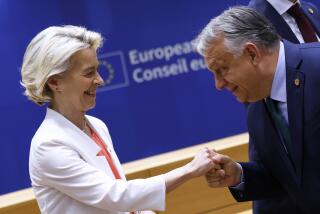Polish Party Set to Follow Hungary Lead : East Bloc: Warsaw’s Communist chief meets Gorbachev and says the ‘socialist’ tag will be used.
- Share via
MOSCOW — The leader of Poland’s Communist Party said after conferring here Wednesday with Soviet President Mikhail S. Gorbachev that it will almost certainly follow the Hungarian party in declaring itself “socialist” and adopting a new political program.
Mieczyslaw Rakowski, first secretary of the Polish United Workers Party, as the Communists are formally known, said that most members favor broad reforms for their party, including a break with many traditional Marxist-Leninist positions.
“Our party must also change its program and its name, and no doubt it will do so at its next congress,” Rakowski said, referring to last week’s decision by the Hungarian Socialist Workers Party to transform itself into a new Socialist party competing for power on an equal footing with other parties to the right and to the left.
Referring to the momentous political shifts in the Soviet Union and Eastern Europe, he said: “Lenin and Marx could not foresee everything. We should not kneel before Lenin and his teachings. We have different problems, different times and different values. At the time Lenin lived, we didn’t have atomic bombs and guided missile cruisers.”
Rakowski said Gorbachev was encouraging these changes--and studying them closely to see how reforms could be accelerated and broadened in the Soviet Union.
“Gorbachev supported and approved the policies undertaken by our new government,” he said, speaking of Warsaw’s new Solidarity-led coalition, the first government in Eastern Europe in four decades that has not been dominated by Communists.
“The main priority is putting the interests of the people first. The government is working to end the current crisis situation in the country.”
The Soviet Union, which in the past intervened in Poland, Czechoslovakia, Hungary and East Germany to ensure Communist orthodoxy, “trusts our party, feels that we are viewing the situation correctly and doing everything to resolve the crisis,” Rakowski said. “Comrade Gorbachev believes the transformations in Poland are historically justified.”
Neither he nor Gorbachev discussed any limits for political and economic reform, he said, and added, “Comrade Gorbachev stressed his allegiance to one tenet--the shape and the organization of any party depends only on that party.”
Noting that the renamed Hungarian Socialist Party has proclaimed itself a Social Democratic party in the broad European tradition, Rakowski said that a majority of Polish Communists have similar ideas about how to transform their party but are uncertain whether they would be closer to the Social Democrats of Sweden or West Germany or Austria.
“Those parties are operating in capitalist countries,” he said, “whereas ours and the Hungarian party are in socialist countries. So I think we will try to find our own type of formula. . . .
“The fact is that today’s transformations mean a moving away from the concept of Communist parties that grew up in the 1930s, away from the Third International (the Moscow-dominated Communist movement). But the question is still open what will be the end result of the transformation.”
Gorbachev’s 3 1/2 hours of talks with Rakowski, and Rakowski’s hourlong press conference, appeared calculated to reassure people in Eastern Europe and in the Soviet Union about the dramatic courses being taken by the Polish and Hungarian Communist parties.
“We are gratified to see the support for us in this country; it has not happened here so often in the past,” Rakowski commented, alluding to the tight restrictions that Moscow formerly imposed on its allies in Eastern Europe.
More to Read
Sign up for Essential California
The most important California stories and recommendations in your inbox every morning.
You may occasionally receive promotional content from the Los Angeles Times.










